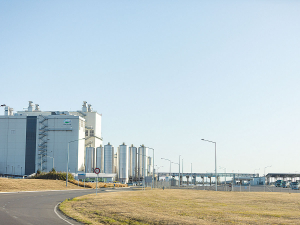Fonterra Suppliers Confident in Mainland Dairy Future
Fonterra's 460 milk suppliers in Australia, who will switch to Lactalis end of this month, are unfazed with the impending change.
 It was Fonterra members, through the shareholders council, who drove the refresh of the strategic purpose in the co-op a few years back.
It was Fonterra members, through the shareholders council, who drove the refresh of the strategic purpose in the co-op a few years back.
OPINION: On their second date, my mother, then 17, told my father that she was a socialist. His response was that he was a conservative, so that would mean that their children would be liberals!
I'm not sure how today's 17-year-olds would take to a response like that, but it worked at the time as they progressed to marriage and children. The influence of their differing beliefs, I think, has helped me understand cooperatives, both as a member, a director, and a researcher/teacher of cooperatives.
When asked to define a cooperative, I say it is a social construct in a capitalist skin. The socialist construct is about being a collective, the reason we are in this together and how we work for the benefit of all, not just the individual; it is the democratic voice of the members and the way they control the destiny of the co-op through voting and participation. It is also about supporting the members, their families and their communities when needed, and providing training and education to ensure members are fully up to date with issues that affect them and the cooperative. Without a focus on this core and a respect for the members, the cooperative becomes meaningless and can crumble. A good example of how the members drive this core was when, quite rightly, it was the members, through the shareholders councils, who drove the refresh of the strategic purpose in Fonterra a few years back.
The capitalist skin is also essential as it drives the business to ensure that profit is achieved, the business grows and responds effectively to changing market forces and a fair distribution is made to members. Without a strong skin and good business principles the cooperative can fail, examples exist of cooperatives stripping the balance sheet to make payments to members, paying today’s members at the expense of future members and the health of the co-op. When a cooperative grows it needs capital, this is provided from a combination of retained earnings and/ or from the price new members pay to join, or through taking on debt. If cooperatives do not price their membership fee to reflect the capital required for growth, it creates an immediate ‘free rider’ issue, the shortfall is picked up in debt, and ongoing costs are then carried by all members, sometimes to their detriment. High levels of debt increase the vulnerability of the business and can lead to selling off of assets, as with Silver Fern Farms, or total dissolution of the cooperative, as with Westland.
Business efficiency is assisted in co-ops by an unusual tension where management are challenged to, for example, sell product at the lowest possible price, at a profit; in stark contrast to their corporate competitors who will be aiming to charge the highest price they can get away with to bolster profits. I like this tension as it keeps management focused and, when done well, enables the business to prosper and provide healthy returns for the members. Done badly, if pricing of what the coop sells or buys results in poor profits, it means there are no funds for reinvestment, growth or innovation, and the cooperative becomes less competitive and can crumble.
There is a healthy tension between the socialist construct and the capitalist skin, both must be strong to ensure the co-op has an understood meaning and is supported by its members, that it is competitive in the market place and excels with its products and services.
Rationale for being
address a need to pull together, ‘we are better together than apart’. Often termed market failure it is the situation when there is a power imbalance where weaker businesses end up paying more for what they buy or get less for what they sell, so they band together to gain some collective strength to improve their lot. When co-ops have been in place for many years it is easy to forget why they formed, so a test of the counterfactual is necessary: ‘would we be any better off in our business if our co-op did not exist?’ There are instances where the co-op does no longer have a role to play as markets have evolved and the power imbalance is less of an issue or has been addressed in different ways. For example, worker cooperatives are far less common now as HR legislation and unions have evolved in their place. Similarly, if the co-op benefit is market price and that can be managed and delivered through other means the question then is what else does collective strength provide to justify it still being a cooperative?
Growing Awareness
Recently there has been considerable growth in requests to Co-operative Business NZ for help from groups looking to set up cooperatives.
Is there perhaps a growing awareness in the power of working collectively or more obvious market failure to address? New Zealand does cooperatives well, we are well known for it and not just in agribusiness, so our willingness puts us in good stead. Pulling together means pooling resources, funds, skills and assets, to set the cooperative up and, over time, investing retained earnings in further assets to enable the cooperative to thrive.
 |
|---|
|
Nicola Shadbolt says co-operatives create to address a need to pull together. |
The assets in some of our established cooperatives have been built up over many years so have been paid for by previous generations of members. They controlled distributions to members, not without quite a few arguments I am sure, to enable the co-op to invest for the future. Just like in a family business the current generation of members benefit, or not, from previous members’ investments and can influence what future generations might gain from membership. Similarly, just as family businesses can protect their assets from any one generation’s incompetence or avarice, the wealth inherent in cooperative membership can be inaccessible to current owners, especially if the membership fee does not change over time, the $1 in, $1 out scenario typical of traditional coops. Alternative forms of co-op membership carry redemption risk as current members can remove their ‘share’ of the wealth as they exit. However, the flip side is that they benefit from new members paying the full worth of their share when they join. So how a co-op evolves its membership rules very much reflects whether it is expanding or shrinking and its commitment to future generations.
There is no such thing as a typical cooperative in NZ as every co-op has evolved in its own way in response to previous members’ aspirations and market conditions; there are common cooperative principles however that have stood the test of time and they reflect the rationale for being a co-op. To learn about each one it is necessary to be aware of these common principles and then to understand the peculiarities of each co-op.
Similarly, if establishing a new cooperative, it is important to be aware of the various options available with respect to ownership, control and benefit distribution, such choices will determine how your co-op and its members succeed. At Co-operative Business NZ we are keen to increase the understanding of cooperatives by the business community, government and society at large and are working with the heads of our business schools to ensure future generations are aware of the role they do and can play in the NZ economy and society.
Nicola Shadbolt is Professor of Farm and Agribusiness Management at Massey University and a former director of Fonterra.
Donald Trump's latest tariff tantrum has again thrown the world of trade into a new round of turmoil and uncertainty, and NZ is caught up in it.
The third edition of the NZ Dairy Expo, held in mid-February in Matamata, has shown that the KISS principle (keep it simple stupid) was getting a positive response from exhibitors and visitors alike.
Twenty years ago, South African dairy farm manager Louis Vandenberg was sent to a farm in Waikato to provide training on Afimilk technology.
Strong farmgate milk price is helping boost investment on farms, says PGG Wrightson chief executive Stephen Guerin.
Fonterra's 460 milk suppliers in Australia, who will switch to Lactalis end of this month, are unfazed with the impending change.
The 5+ A Day Charitable Trust has launched a collection of affordable recipes designed to turn everyday vegetables into seasonal stars.
OPINION: Is it a case of over promising and under delivering? Farmers think so.
OPINION: The UK dairy industry is celebrating a win after plant-based drink maker Oatly lost a long-running legal battle over…